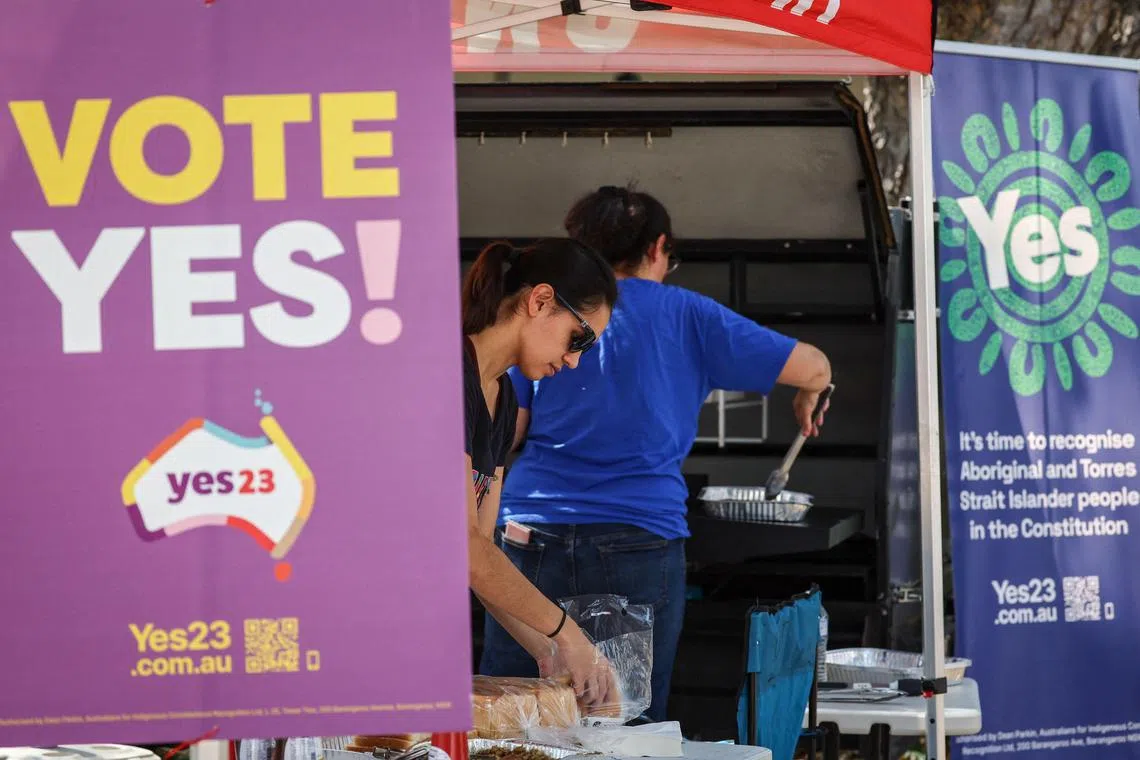What to know about Australia’s Indigenous ‘Voice to Parliament’ referendum
Sign up now: Get insights on Asia's fast-moving developments

Supporters of the YES campaign at their booth in the centre of the Northern Territory capital city of Darwin on Aug 30, 2023.
PHOTO: AFP
SYDNEY - Australians will be asked to vote in a referendum on Oct 14 to constitutionally recognise its indigenous people
Here’s what you need to know about Australia’s Voice to Parliament campaign:
Who are Australia’s indigenous people?
Aboriginal and Torres Strait Islander people are the indigenous people of Australia.
They represent about 3.2 per cent of its population. The more than 800,000 Indigenous people and their ancestors have inhabited the land for at least 60,000 years. They comprise several hundred groups that have their own histories, traditions and languages.
What are the issues?
Australia’s Indigenous population plummeted after British colonisation began in 1788 as they were dispossessed of their land, exposed to new diseases, forced to work in slave-like conditions, and killed by colonisers.
The marginalisation of Australia’s First Nations people has continued until recent years.
Aboriginal people track below national averages on most socio-economic measures and suffer disproportionately high rates of suicide, domestic violence and imprisonment. Their life expectancy is about eight years shorter than non-indigenous people.
One in three indigenous children were forcibly removed from their families from 1910 to the 1970s in a bid to assimilate them into white society. The government apologised for the so-called “stolen generation” in 2008.
Are other former British colonies better?
First Nations people in other former British colonies continue to face marginalisation, but some countries have done better in ensuring their rights.
Canada recognises the rights of its indigenous people under the Constitution Act 1982.
New Zealand’s 1840 Treaty of Waitangi promises to protect Maori culture. The country also created Maori seats in parliament, allowing the indigenous population to choose to vote for candidates for these seats or participate in the general election.
Te reo Maori has been recognised as an official language and is used in schools, universities and public offices.
How did the Voice referendum come about?
Indigenous people began to be included in Australia’s census figures after a referendum to amend the constitution in 1967, more than 60 years after it was established as a nation in 1901.
In 2017, about 250 First Nations representatives gathered at the sacred monolith landmark of Uluru in central Australia and produced the Uluru Statement from the Heart, which calls for a First Nations Voice enshrined in the Constitution.
The conservative government at the time rejected the call.
In 2022, Labor Party’s Anthony Albanese became prime minister and said Australians would have their say in a referendum to include an Aboriginal and Torres Strait Islander Voice to Parliament.
Who is for and against the Voice?
The latest Guardian poll in August showed more Australians are planning to vote “no” in the referendum than “yes”. Other polls also showed a majority in most states will vote against the constitutional change.
The referendum is one of Mr Albanese’s key issues and he has staked much of his political capital on it.
The left-wing Australian Greens party, some independent lawmakers, several welfare groups, national religious and ethno-religious groups also support the referendum.
But there are those who oppose it on both sides of the political divide.
Independent indigenous senator Lidia Thorpe quit the Greens over concerns about the Voice proposal. She wants a treaty between the government and indigenous people first, similar to what exists in New Zealand and Canada.
The conservative Liberal Party and the rural-based National Party are against the proposal and are asking Australians to vote “no” in the referendum. The Liberals and the Nationals have a long-standing coalition agreement.
A “no” campaign, or “Recognise a Better Way” campaign, has proposed to set up an all-party parliamentary committee to focus on the rights of native title holders instead of establishing a Voice to Parliament through a referendum. REUTERS


